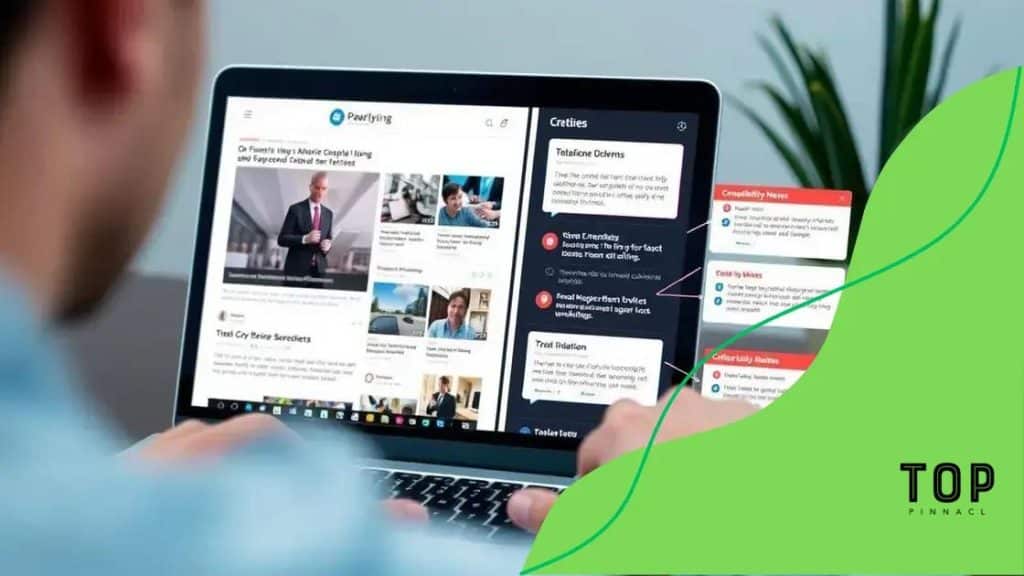News credibility tools: how to navigate misinformation

News credibility tools are essential for verifying information and distinguishing reliable news from misinformation, ensuring that users make informed decisions in the digital media landscape.
News credibility tools are increasingly vital in a world flooded with information. Have you ever doubted a news article’s authenticity? Let’s explore how these tools can sharpen your ability to discern truth from misinformation.
Understanding news credibility tools
Understanding news credibility tools is essential in today’s world where misinformation can easily spread. With so many sources of information available, it’s crucial to know which tools to trust and how to use them effectively.
What are news credibility tools?
News credibility tools are designed to help individuals assess the reliability of news articles, reports, and sources. These tools use various methodologies to verify facts, analyze sources, and highlight potential biases.
Why are they important?
In a landscape filled with fake news and misleading information, these tools empower users to make informed decisions. By identifying credible sources, readers can cultivate a more accurate understanding of events and issues.
- Enhance critical thinking skills.
- Reduce the spread of misinformation.
- Encourage responsible media consumption.
Additionally, many tools offer user-friendly features that allow everyone, regardless of their media expertise, to evaluate information easily. For example, they may include browser extensions that flag suspicious articles or provide ratings for news sources.
Ultimately, leveraging these tools can help us navigate the complex media landscape. By focusing on credibility, we can foster a well-informed society that values truth and transparency.
Top tools for fact-checking news
There are several top tools for fact-checking news that can help you verify information quickly and efficiently. These tools are essential in combating misinformation and enhancing your media literacy.
Popular Fact-Checking Tools
Some of the most reliable fact-checking tools include Snopes, FactCheck.org, and PolitiFact. Each of these websites offers unique features that can aid in assessing the credibility of news stories.
- Snopes: Known for debunking myths and rumors, Snopes provides in-depth investigations of various claims.
- FactCheck.org: This tool focuses on political claims and provides a nonpartisan analysis of misinformation.
- PolitiFact: Offers a truth-o-meter to rate the accuracy of statements made by politicians and public figures.
Using these tools can empower you to recognize reliable news sources. Additionally, many of these platforms are user-friendly, making it easy for anyone to navigate and find the information they need. It’s important to utilize these resources when you encounter news that seems questionable or too sensational to be true.
Fact-checking tools also often offer browser extensions that provide real-time evaluations of articles as you browse the web. This feature allows you to make informed decisions on the spot, ensuring that you’re consuming accurate information. Each tool plays a crucial role in fostering a culture of informed understanding of current events.
How to evaluate sources effectively

Knowing how to evaluate sources effectively is crucial for ensuring the accuracy of the information you consume. This skill allows you to identify reliable data and avoid misinformation.
Key Criteria for Evaluation
When assessing a source, consider several important criteria. Look for the author’s credentials, the date of publication, and the website’s reputation.
- Authority: Is the author an expert in the field? Check their background and experience.
- Date: When was the information published? Current news is often more relevant.
- Objectivity: Evaluate whether the source presents information fairly or has a bias.
In addition to these criteria, cross-referencing is vital. Compare the information from multiple sources to see if they align. If several reputable outlets are reporting the same facts, that typically indicates reliability.
Another effective method is to use fact-checking websites that offer insights into the accuracy of the information. These tools can confirm claims and provide context that may be missing in standard articles. By actively engaging in this process, you’re becoming a discerning consumer of media.
Ultimately, developing a habit of questioning sources helps you build a comprehensive understanding of news and events. As you practice these skills, you’ll become better equipped to navigate the complex media landscape.
The role of AI in assessing credibility
The role of AI in assessing credibility is becoming increasingly significant as misinformation spreads rapidly. Artificial intelligence can analyze vast amounts of data to help identify trustworthy information.
How AI Works in Credibility Assessment
AI algorithms evaluate news articles by examining various factors, such as the source, the language used, and the context of the information. By processing this data quickly, AI can flag potential inaccuracies.
- Source Evaluation: AI checks the reputation of the source against a database of verified outlets.
- Content Analysis: Natural language processing (NLP) is used to identify biased language or emotional wording.
- Fact-Checking Integration: Many AI tools can cross-reference statements with established fact-checking databases.
These processes help users distinguish between reliable news and questionable content. Additionally, AI-driven tools can provide alerts when a piece of information is shared widely yet is flagged as false.
As AI continues to improve, its ability to assist in identifying credible sources will likely enhance public trust in news media. Daily, people are exposed to a mix of facts and fiction online. Thus, leveraging AI helps society navigate this complex landscape effectively. The potential of AI in transparency and reliability is promising, making it a vital player in the future of information integrity.
Tips for improving your news literacy
Improving your news literacy is essential in today’s fast-paced media environment. By enhancing your skills, you can make better decisions about the information you consume.
Understand Different Types of Media
Become familiar with various news formats including articles, videos, podcasts, and social media posts. Each format can present information differently, which may affect how you interpret it.
- Recognize Bias: Different outlets may have different agendas. Learn to spot bias in reporting.
- Check Sources: Always verify where the news is coming from. Reliable sources typically have a good track record.
- Expand Your Horizons: Explore a variety of perspectives on the same topic to gain a well-rounded understanding.
Reading critically involves questioning the content you encounter. Don’t take everything at face value. Ask yourself who wrote the article and what their motives might be. This approach encourages deeper thinking about the information presented.
Practice identifying the main message of articles while considering how the language used influences your perception. Look for emotional words that may sway your opinion.
Finally, engage in discussions with others about news topics. Exchanging views can help clarify your understanding and reveal new insights. Remember, becoming media literate is an ongoing process that evolves as you learn and grow in the digital age.
In conclusion, understanding news credibility tools and enhancing your news literacy are essential skills in today’s information age. By using fact-checking tools, evaluating sources effectively, and leveraging the power of AI, you can better navigate the complex landscape of news. Remember, being an informed consumer of media not only benefits you but also contributes to a well-informed society.
FAQ – Frequently Asked Questions about News Credibility Tools and Literacy
What are news credibility tools?
News credibility tools help users determine the reliability of news sources and verify the accuracy of information.
How can I improve my news literacy?
You can improve your news literacy by using multiple sources, checking author credentials, recognizing bias, and engaging in discussions.
Why is it important to evaluate news sources?
Evaluating news sources ensures that you consume accurate information and reduces the potential impact of misinformation.
How does AI assist in assessing the credibility of news?
AI analyzes data from various sources, checking for biases, and can cross-reference claims with established fact-checking databases.






